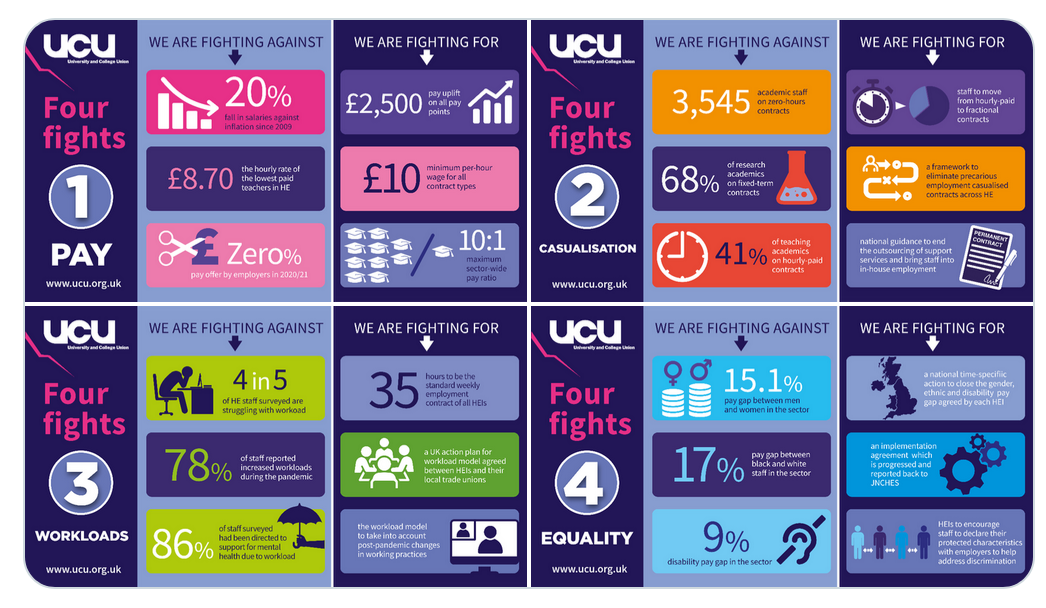The UCU Strikes: An Overview
By Milan Gregory Perera, Second Year English
Strikes were back in Bristol from 1-3 December, as the UCU resumed industrial action against university administrations across the UK. In this piece, the Bristorian aims to contextualise their demands, and offer some student perspective on the 4th set of strikes in as many years.
Universities across the country have just experienced a string of pickets. The University and College Union (UCU), a trade union representing some 130,000 academics, lecturers, trainers, IT staff and librarians across the UK, unanimously decided to launch a nationwide walk out from 1-3 December over unsatisfactory working conditions and dwindling pensions. An overwhelming majority (82%) of the UCU branch of University of Bristol voted in favour of industrial action until these ongoing issues are resolved.
According to the UCU the industrial action revolves around what they refer to as “Four Fights.” First, the real term pay cut by 20% based on the employers' current offer and the most recent inflation data. Second, the casualisation of work. Third, the unsustainable workload and fourth, the disparity of pay based on gender, ethnicity, and disability.
Out of these four disputes, casualisation has been a burning issue which the university authorities seemed to have failed to address. It goes without saying that, as in any other line of work, the job security of the university staff is of paramount importance. The reports indicate that around 68% of all the research staff are on fixed contracts, making matters more complicated is that some of these positions are funding dependant. Despite employers’ reports that there has been significant progress in this area, the UCU challenged such claims, saying that the statistics have hardly changed over the last three years. The UCU feels that casualisation erodes basic but important rights of the staff, as it makes it almost impossible to challenge unethical workplace practices.
The UCU has also expressed their frustration that the employers have not taken the issue around workload seriously as 4 in 5 of Higher Education staff surveyed are struggling with the workload. It is quoted that 86% of staff had been directed towards support for mental health.
According to the UCU the pay disparity based on gender, ethnicity and disability remains in place, citing a 15.1% pay gap between men and women in the sector. Black staff members are paid 17% less than their white colleagues, while disabled members are paid 9% less than their non-disabled counterparts.
Further to these “Four Fights”, the dispute over pensions still looms large. The UCU reiterates that an average member is about to lose 35% from their pension fund, the primary source of income for many members upon their retirement.
An infographic produced by the UCU, outlining their reasons for industrial action.
The National Student Union (NSU) and various student bodies expressed their solidarity with their lecturers and academic staff regarding the industrial action. Yet not all students are entirely convinced about the premise and the timing of these strikes.
A third year Humanities student, wishing to remain anonymous, expressed their concerns regarding the latest set of strikes:
“I fully understand and respect the UCU’s frustrations with university administrations. What is going on is unacceptable. However, it is evident that strikes are not having their desired effect. The fact that this is the 4th set of strikes over largely the same issues suggests that alternative tactics should be considered, as clearly university administrations are not the ones being affected by industrial action. If the UCU wants to bolster, rather than hinder, its support, perhaps it should work with the student body, not penalise it.”
Yet for many the strikes are about more than pensions and working conditions, also representing a protest against stealth attempts to marketise the Higher Education system. Charlie Gadd, spokesman for the Socialist Worker Student Society told us that:
“This is about more than pensions. The attack is part of wider agenda pushing marketisation and privatisation in Higher Education. As students we face higher fees, course closures and an education system run like a business. We should support our staff taking a stand against the plans to decimate education.”
The 10-year tug of war between the universities and the staff is set to continue, as ‘action short of a strike’ will be in place until the 3rd of May, some five months from now.
All figures quoted can be found here on the UCU’s website
Further information on the ‘Four Fights’ can be found here

